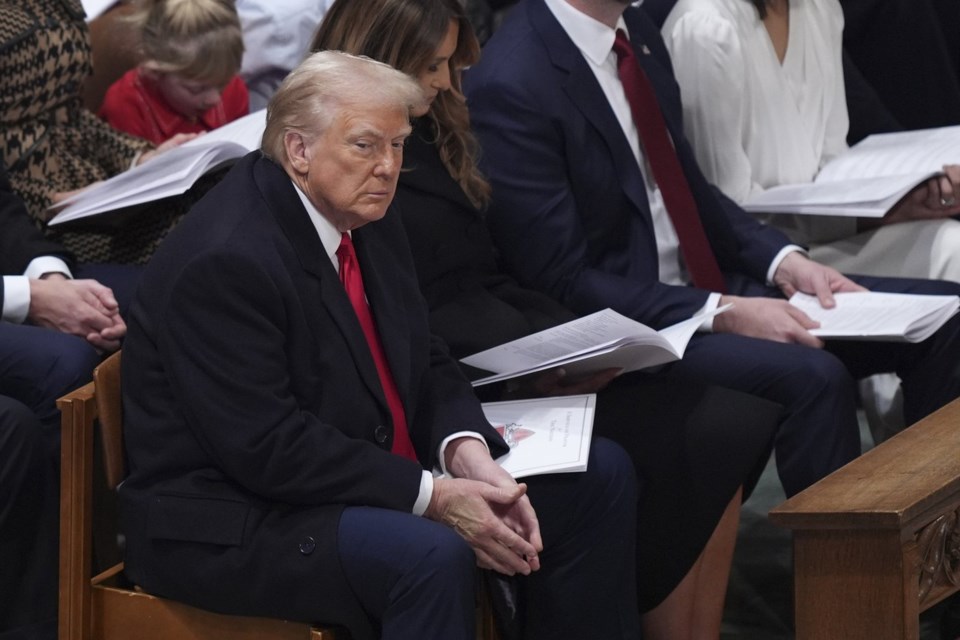TORONTO — A CIBC report says sweeping tariffs imposed by the U.S. could cost the Canadian economy as much as 3.25 per cent, even factoring in possible exemptions for the oil and gas sector.
An analysis published Tuesday examined four potential scenarios in which U.S. President Donald Trump slaps new taxes on goods imported from Canada, ranging from 10 to 20 per cent and with possible carve-outs for key industries.
Speaking with reporters on Monday evening, Trump said he's thinking about hitting Canada and Mexico with 25 per cent tariffs on Feb. 1.
Prime Minister Justin Trudeau has said Canada would respond and that "everything is on the table."
The CIBC report said a 20 per cent tariff that excludes commodities — which make up around 46 per cent of Canadian exports to the U.S. — would still result in a GDP hit of 3.25 per cent.
Under a more conservative scenario where only a 10 per cent tariff is applied and excludes both commodities and the auto sector, the impact to the Canadian economy would be around 1.35 per cent. That hypothetical would exempt roughly 60 per cent of Canadian exports to the U.S.
The report suggested the Trump administration might not want to tax those sectors as they rely heavily on close integration with Canadian counterparts. It noted the oil and gas and auto sectors represent 28 and 14 per cent, respectively, of total Canadian exports to the U.S.
"Doing so would come at a key cost to American jobs, contradict Trump’s cheap energy initiatives, and materially increase inflation," it said.
"Realistically, we do not believe a permanent 25 per cent sweeping tariff is a credible threat in the immediate future — implementation hurdles, negotiation, and the high risk of retaliation in this scenario makes it little feasible that a trade war will get that far — at least in our opinion anyways."
Trump has appeared undeterred in previous remarks about his tariff threat, telling reporters earlier this month "we don't need their cars and we don't need the other products."
But while Trump had been threatening to impose punishing tariffs on Canada on his first day in office, he opted instead on inauguration day to announce a plan to study alleged unfair trade practices.
The president signed an executive order directing that the study be completed by April 1.
The CIBC analysis was based solely on potential effects of an initial tariff, rather than the combined impact of any retaliatory measures.
At a cabinet retreat in Montebello, Que., Trudeau said Tuesday the federal government is focused on avoiding tariffs but that Canada is prepared to reply if they are implemented.
He added that if Trump wants to usher in a "golden age" for the U.S., he'll need the energy, critical minerals and resources that Canada is ready to provide.
A separate report published Tuesday by TD Economics highlighted the importance of the Canada-U.S. trade relationship to both countries, along with likely consequences of such protectionist stances.
The study by economists Marc Ercolao and Andrew Foran said the president's recent claim about Canada-U.S. auto trade ("They make 20 per cent of our cars," Trump said at a Jan. 7 press conference) exaggerates the share of vehicles sold in the U.S. that are produced in Canada by about 10 percentage points.
"The U.S. could conceivably look to shift this production stateside, but (faces) significant near-to-medium term challenges to replacing Canada’s annual exports of around 1.5 million units," they wrote.
The authors also pointed out the importance of Canadian energy exports to the U.S., which are responsible "for all of the U.S. trade deficit with Canada."
The U.S. would have a trade surplus with Canada of around $60 billion without the oil, natural gas and power sold by Canada to its southern neighbour.
"Remove Canadian energy exports from the equation and the trade story flips," the report said.
While Trump has claimed the U.S. subsidizes Canada to the tune of US$200 billion in the context of trade between the two countries, Ercolao and Foran said it's "unclear where President Trump or his team derived this number."
They said the figure is roughly four to five times larger than officially reported statistics surrounding the U.S.'s trade deficit with Canada.
"In any event, a trade deficit is not a subsidy. That would ring true, if for example, the U.S. government transferred US$45 billion annually to Canadian companies out of goodwill, but Americans are receiving value for the dollars spent in the form of goods and services," the report said.
"The trade deficit the U.S. runs with Canada reflects their economic outperformance and above-average spending of Americans that’s driving a hunger for energy products."
This report by The Canadian Press was first published Jan. 21, 2025.
Sammy Hudes, The Canadian Press




